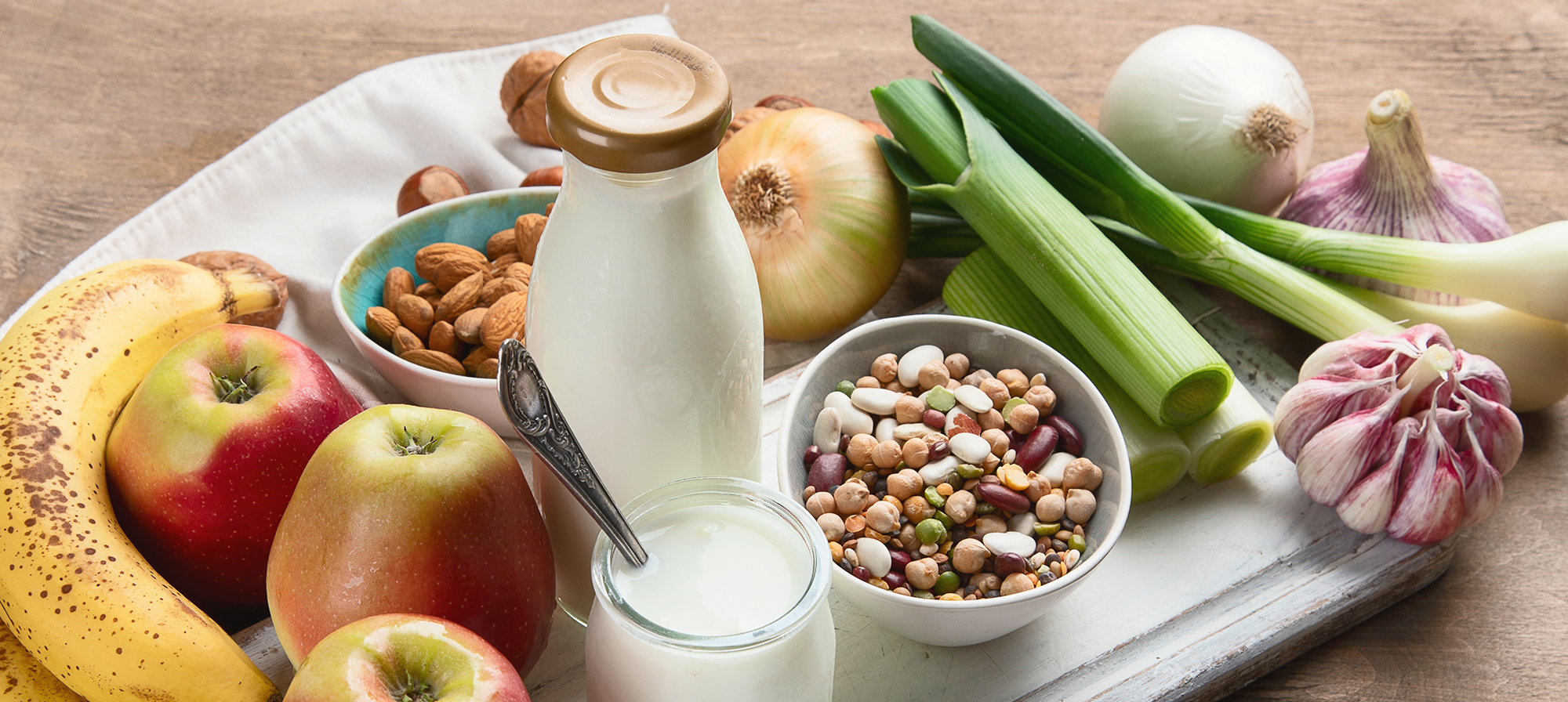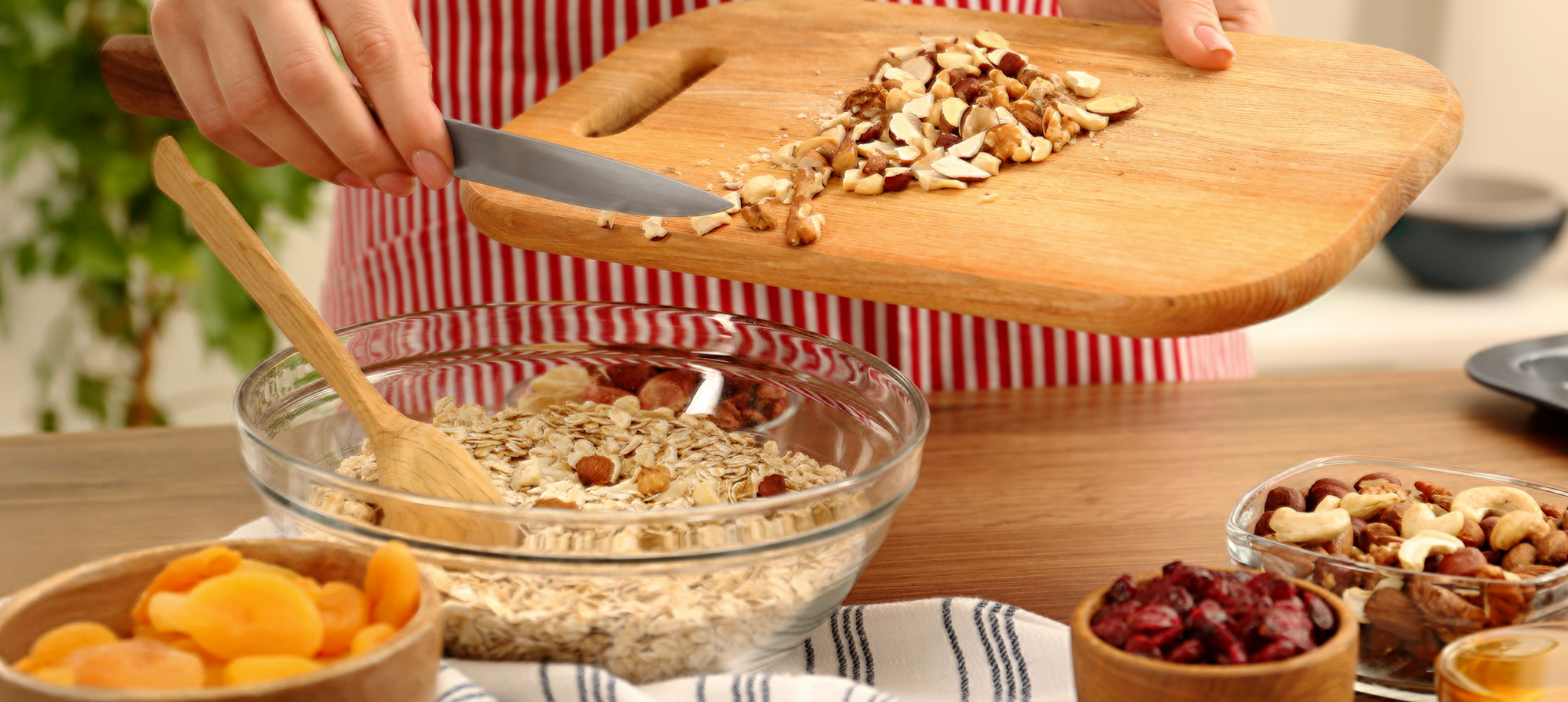Your gut health can impact your overall health in many ways. Learn how to support a healthy gut—and a healthy you—with probiotics and prebiotics.
Probiotics and prebiotics have been getting a lot of attention these days. That’s because eating foods that contain them can lead to better gut health. And that can lead to better overall health.
To understand how probiotics and prebiotics work, you first need to understand your gut microbiome. Your microbiome is the community of bacteria and other microbes (microorganisms) that live inside your intestines. Your microbiome contains both helpful and harmful microbes. The key is keeping your gut health balanced so the good bacteria outnumber the bad.
Imagine it is a vegetable garden. If you feed and nourish it, it will thrive and feed you, too. But if you neglect it, weeds may start to crowd out your vegetables. Pests can invade and harm the plants.
That’s where probiotics and prebiotics come into play. Probiotics are friendly bacteria that you can add to your gut microbiome. Prebiotics are certain types of fiber that feed the good bacteria in your gut.

What do probiotics do?
When you consume probiotics, you're adding to the friendly bacteria living in your gut. That can improve your gut health. And research has shown that this can have a positive impact on your overall health. A healthy gut may help boost your immune system, lower inflammation, improve digestion, and more.
Eating fermented foods is one way to get probiotics. One study found that eating these foods can in fact change your microbiome for the better. In the study, participants added fermented foods to their meal plan for 10 weeks. At the end of the study, they were left with a more diverse range of friendly gut microbes. They had less inflammation, too, showing a positive effect on the immune system.
Where can you get probiotics?
As mentioned, you can get probiotics naturally by eating fermented foods. That’s because these foods are preserved using lactic acid bacteria. Yogurt is a well-known fermented food. But there’s also kombucha (fermented tea), tempeh (fermented soybeans), and sauerkraut (fermented cabbage), among others.
When looking for fermented foods, make sure to check the label. In some cases, foods are preserved in vinegar instead of being fermented. Vinegar is acidic, so it can keep foods from spoiling—but it does not contain probiotics. In other cases, the helpful bacteria can be killed off when the food is pasteurized. To make sure you’re getting probiotics, look for “naturally fermented” or “live and active cultures” on the label. You can also read the list of ingredients for specific strains.
Another way to get probiotics is through supplements. You’ve probably seen them in the store. But keep in mind that the health claims made on the label may not be backed by research. While there’s evidence that probiotics in general can be good for your health, more studies are needed to learn exactly what specific strains can do. Plus, supplements are not regulated by the U.S. Food and Drug Administration (FDA).
If you’re interested in probiotic supplements, it’s a good idea to talk with your doctor first. This is especially true if you have a health condition. Probiotics may help certain conditions, especially those affecting the gut. Your doctor can guide you in getting the right probiotics for you, whether that’s through supplements or food—or both.

What do prebiotics do?
Prebiotics are certain types of fiber, such as galactooligosaccharides (GOS) and inulin. These fibers feed the good microbes in your gut, helping them to thrive. As the good microbes multiply, they crowd out the bad ones that cause disease.
Like other fibers, your body can’t break down prebiotics. But the good bacteria living in your large intestine (colon) can. Once the prebiotics make it all the way through your digestive tract to your colon, your friendly microbes break down and ferment them. This process creates a range of short-chain fatty acids (SCFAs). Those SCFAs help your gut health by providing energy to your colon cells, lowering inflammation, boosting immunity, and more.
Where can you get prebiotics?
To feed the many different microbes in your gut, try to eat a variety of prebiotic foods. Like probiotics, you can buy prebiotic supplements. But you can get plenty of prebiotics by eating high-fiber foods.
Although not all high-fiber foods contain prebiotics, many do have the right stuff. Plus, all types of fiber are good for digestion. For instance, insoluble fiber holds on to water and helps move food along your digestive tract. So, try to eat a range of plant-based foods to get different types of fiber. Here are some that are known to be high in prebiotics:
- Whole grains: old-fashioned oats, steel-cut oats, and whole grain bread
- Fruits: blueberries, green bananas, and apples
- Veggies: asparagus, spinach, artichokes, garlic, onions, and leeks
- Legumes: beans, peas, and soybeans
- Nuts and seeds: almonds, flax seeds, and chia seeds
For a healthy dose of prebiotics, try this spinach salad with raspberry dressing.
If you’re not eating a lot of fiber now, add it to your food plan slowly. Adding a lot at once can lead to side effects like uncomfortable gas and bloating, diarrhea, or constipation.
Try adding just one high-fiber food at a time. You could swap your regular breakfast for a bowl of oatmeal or eat an extra piece of fruit one day. If that feels OK, add another fiber source. To help prevent side effects, spread out your fiber intake throughout the day, drink more water, and stay active. If you do start to feel any side effects, slow down the process.
Along with eating more fiber, you can help support a healthy gut by limiting sugar and processed foods. These foods harm rather than help your friendly bacteria. If you feel your sweet tooth gets the best of you, check out these 5 tips to help you break free from a sugar habit.
How probiotics and prebiotics work together to support gut health
Probiotics and prebiotics each play a role in supporting a balanced and healthy microbiome. Your microbiome in turn supports the health of so many of your body’s systems. When your microbiome is healthy, it helps support your:
- Digestion. The good microbes in your gut help break down carbs and fibers that your body can’t. They also provide enzymes to create certain vitamins, including vitamins B1, B9, B12, and K. And they help metabolize bile. This is an important process that helps you digest and absorb fats and helps keep cholesterol out of your bloodstream.
- Immune system. Your gut houses up to 80 percent of your immune cells. These cells help protect you from harmful viruses and bacteria that pass through. And the SCFAs produced by your friendly gut microbes help keep inflammation down.
- Nervous system. Your nervous system is the way your brain and body communicate. Your gut plays a role in that. Certain bacteria in your gut can produce neurotransmitters, which send messages between the cells in your body and brain. SCFAs may also have a positive effect on your nerves. Researchers are looking into how your gut health may affect conditions like mood disorders and nerve pain.
- Metabolism. Your gut is home to many of your endocrine cells. These cells produce hormones that regulate your metabolism. They can affect things like blood sugar and hunger. Researchers don’t yet know the exact role of your microbiome in these processes. But they are looking into how it may affect conditions like obesity and Type 2 diabetes.
There is still a lot to learn about the microbiome and how specific probiotics affect it. But what is known is that both prebiotics and probiotics are key to building and maintaining a healthy gut—and better overall health in the bargain. So, give your gut what it needs with a healthy diet full of fermented and fiber-rich foods. 
Not a Silver&Fit® member? Learn more about everything the program has to offer, including more helpful healthy living tips like this, here on our website.
This information is not intended to take the place of regular medical care or advice. Please check with your doctor before using this information or beginning any self-care program. Images used for this article do not depict any members of the Silver&Fit Program.
References
Carlson J. L., Erickson J. M., Lloyd B. B., & Slavin J. L. (2018). Health effects and sources of prebiotic dietary fiber. Current Developments in Nutrition,2(3), nzy005. https://doi.org/10.1093/cdn/nzy005
Children’s Hospital of Philadelphia. (2022, November). Food as medicine: Prebiotic foods. https://www.chop.edu/health-resources/food-medicine-prebiotic-foods
Cleveland Clinic. (2022, March 14). What are prebiotics and what do they do? Health Essentials. https://health.clevelandclinic.org/what-are-prebiotics/
Cleveland Clinic. (2023, August 18). Gut microbiome. https://my.clevelandclinic.org/health/body/25201-gut-microbiome
Davani-Davari, D., Negahdaripour, M., Karimzadeh, I., Seifan, M., Mohkam, M., Masoumi, S. J., Berenjian, A., & Ghasemi, Y. (2019). Prebiotics: Definition, types, sources, mechanisms, and clinical applications. Foods, 8(3), 92. https://doi.org/10.3390/foods8030092
Harvard Health Publishing. (2022, November 14). Probiotics and prebiotics: What’s really important. https://www.health.harvard.edu/nutrition/are-you-getting-essential-nutrients-from-your-diet
Harvard T. H. Chan School of Public Health. (n.d.). The microbiome. https://www.hsph.harvard.edu/nutritionsource/microbiome/
Khalesi, S., Bellissimo, N., Vandelanotte, C., Williams, S., Stanley, D., & Irwin, C. (2019). A review of probiotic supplementation in healthy adults: Helpful or hype? European Journal of Clinical Nutrition, 73(1), 24–37. https://doi.org/10.1038/s41430-018-0135-9
Kothari, D., Patel, S., & Kim, S. K. (2019). Probiotic supplements might not be universally-effective and safe: A review. Biomedicine & Pharmacotherapy, 111, 537–547. https://doi.org/10.1016/j.biopha.2018.12.104
Marco, M. L., Sanders, M. E., Ganzle, M., Arrieta, M. C., Cotter, P. D., De Vuyst, L., Hill, C., Holzapfel, W., Lebeer, S., Merenstein, D., Reid, G., Wolfe, B. E., & Hutkins, R. (2021). The International Scientific Association for Probiotics and Prebiotics (ISAPP) consensus statement on fermented foods. Nature Reviews Gastroenterology & Hepatology, 18(3), 196-208. https://doi.org/10.1038/s41575-020-00390-5
Mayo Clinic. (2022, November 4). Dietary fiber: Essential for a healthy diet. https://www.mayoclinic.org/healthy-lifestyle/nutrition-and-healthy-eating/in-depth/fiber/art-20043983
Mohajeri, M. H., Brummer, R. J. M., Rastall, R. A., Weersma, R. K., Harmsen, H. J. M., Faas, M., & Eggersdorfer, M. (2018). The role of the microbiome for human health: From basic science to clinical applications. European Journal of Nutrition, 57(Suppl 1), 1-14. https://doi.org/10.1007/s00394-018-1703-4
National Center for Complementary and Integrative Medicine. (2019, July). Probiotics: What you need to know. https://www.nccih.nih.gov/health/probiotics-what-you-need-to-know
Palken, J. (n.d.) Prebiotics: What, where, and how to get them. UMass Chan Medical School Center for Applied Nutrition. https://www.umassmed.edu/nutrition/ibd/ask-Nutritionist/prebiotics-what-where-and-how-to-get-them/
Sanders, M. E., Merenstein, D. J., Reid, G., Gibson, G. R., & Rastall, R. A. (2019). Probiotics and prebiotics in intestinal health and disease: from biology to the clinic. Nature reviews. Gastroenterology & Hepatology, 16(10), 605–616. https://doi.org/10.1038/s41575-019-0173-3
Wastyk, H. C., Fragiadakis, G. K., Perelman, D., Dahan, D., Merrill, B. D., Yu, F. B., Topf, M., Gonzalez, C. G., Van Treuren, W., Han, S., Robinson, J. L., Elias, J. E., Sonnenburg, E. D., Gardner, C. D., & Sonnenburg, J. L. (2021, August 5). Gut-microbiota-targeted diets modulate human immune status. Cell, 184(16), 4137-4153 e4114. https://doi.org/10.1016/j.cell.2021.06.019
Weaver, J. (2021, July 12). Fermented-food diet increases microbiome diversity, decreases inflammatory proteins, study finds. Stanford Medicine News Center. https://med.stanford.edu/news/all-news/2021/07/fermented-food-diet-increases-microbiome-diversity-lowers-inflammation
Wood, M. (n.d.). How the microbiome affects human health, explained. UChicago News. https://news.uchicago.edu/explainer/how-microbiome-affects-human-health-explained
Zeratsky, K. (2020, July 10). What are probiotics and prebiotics? Mayo Clinic. https://www.mayoclinic.org/healthy-lifestyle/consumer-health/expert-answers/probiotics/faq-20058065
Zhang P. (2022). Influence of foods and nutrition on the gut microbiome and implications for intestinal health. International Journal of Molecular Sciences, 23(17), 9588. https://doi.org/10.3390/ijms23179588
This article was written by Keleigh Somes, edited by Gail Olson, and last clinically reviewed by Elizabeth Thompson, MPH, RD, on December 20, 2023.





